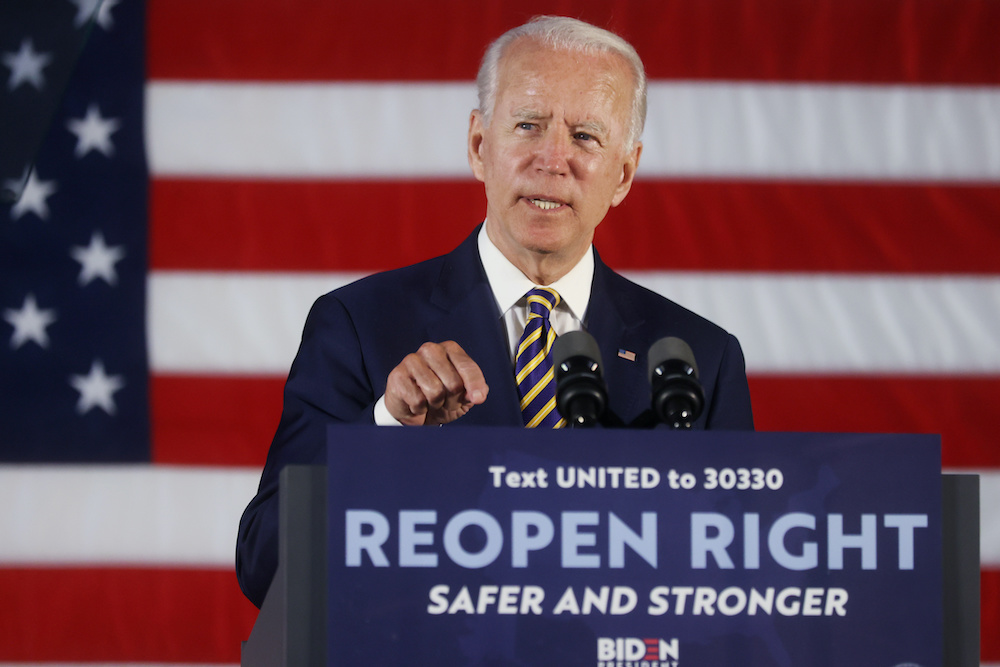
Former Vice President Joe Biden, the presumptive Democratic nominee for president, speaks during a campaign event in Darby, Pennsylvania, June 17, during the coronavirus pandemic. (CNS/Reuters/Jonathan Ernst)
This Huffington Post article about former Vice President Joe Biden, acknowledging the influence of Sen. Elizabeth Warren on his economic proposals, highlights a principal Republican blind spot. Kevin Robillard reported:
Republicans are likely to attack Biden, who has a healthy lead over President Donald Trump in polling, for acknowledging Warren's influence. The GOP has argued that Biden's election would empower radical elements of the Democratic Party despite his center-left stances on most policy issues.
The problem with this GOP strategy is that once you get past the name-calling, Warren's economic populism is enormously popular with the American people.
According to the Pew Research Center, two thirds of Americans support increasing the minimum wage to $15 per hour. Gallup reports that 64% of Americans have a favorable opinion of labor unions, the highest number in almost 20 years. Although Biden has not gone there yet, majorities of both Democrats and Independent voters favor Medicare for All, according to the Kaiser Family Foundation.
The economic catastrophe brought on by the COVID-19 pandemic has made Americans even more inclined to support government intervention in the economy. Various polls repeatedly show overwhelming support for government stimulus bills, reinforcing a trend that Gallup says has been going on for 10 years.
My mantra in recent weeks brings together concern to protect the environment with the economic reality brought on by the pandemic and does so in a way that unites the left's more aggressive and more moderate temperaments: Whether or not you thought we needed the Green New Deal for environmental reasons, we definitely need it now for economic reasons. A full-scale, World War II-style mobilization of the economy will be needed to get us out of the COVID-19 depression.
Biden's proposals unveiled last week focus on using the purchasing power of the federal government to buy American, to purchase green technology in ways that spur further investment in renewable resources, and to purchase in ways that create opportunities in economically depressed communities.
Advertisement
Newt Gingrich, the former Speaker of the House and the most loquacious spouse of a U.S. ambassador to the Holy See in history, tried to steal some of the thunder from Biden's adopting of Warren's ideas. Asked about Biden's policy proposals, he told the show "Fox and Friends": "I think that proves that Biden has good pollsters. They do good focus groups, and they said, 'You know, the president has a good message, why don't you steal it?'"
Gingrich was on to something. Certainly, Biden knew what he was doing when he returned to his native Scranton, Pennsylvania, to deliver his economic speech: It is an area Trump took from the Democrats in 2016. Lest we forget, Trump really did campaign as an economic populist four years ago, only to pass a Wall Street-approved tax cut that did not address the underlying problems facing working-class people. Besides, the problem with the Gingrich interpretation now is that people understand the nation's economy is being devastated anew — and as we speak — because of Trump's failure to reopen the economy properly with plenty of testing, relentless cautions, requiring social distancing and otherwise doing what other countries are doing, countries that are not having to reshutter their economy because the virus is back.
I slept better after Biden's speech for an entirely different reason. The fact that he consulted Warren, listened to her, adopted some of her ideas and gave her credit may or may not indicate that he is considering naming her as his running mate. It could be a trial balloon. But, either way, it shows that Warren has become the policy oracle and engine for the entire Democratic Party, and that not only increases Biden's chances of winning, it vastly improves his chances at successful governing.
This ties in with my column on Monday. The challenge for the Democrats this year has always been to acknowledge that the problem — and it really was one problem, the loss of economic opportunity in hundreds of cities, large and small, for people with no college education — that led to Trump's victory was real, and that for too long Democrats contributed to that problem. They need to argue simultaneously that there is no way to fix that problem unless the voters first fix a different problem: Trump promised to bring hope to people left by the side of the road during the years of globalization and deindustrialization, and he failed to deliver. If the electorate will fix the Trump problem, the Democrats have to promise to fix the lack of opportunity and consequent income inequality problem.
No Democratic personage has spent more time trying to fix the underlying problem, before entering politics in 2010 and since, than Elizabeth Warren. She is the Democratic Party's policy rock star, and the mess Trump and the virus have made demand a rock star. It would help if, next January, Warren is the vice president with an office in the West Wing. However, so long as she is the one to whom the Democrats turn when they ask the question "How do we fix this?" the party has a chance at reclaiming its historic role as the champion of the working class and, just so, making that history its destiny as well.
[Michael Sean Winters covers the nexus of religion and politics for NCR.]
Editor's note: Don't miss out on Michael Sean Winters' latest. Sign up and we'll let you know when he publishes new Distinctly Catholic columns.





